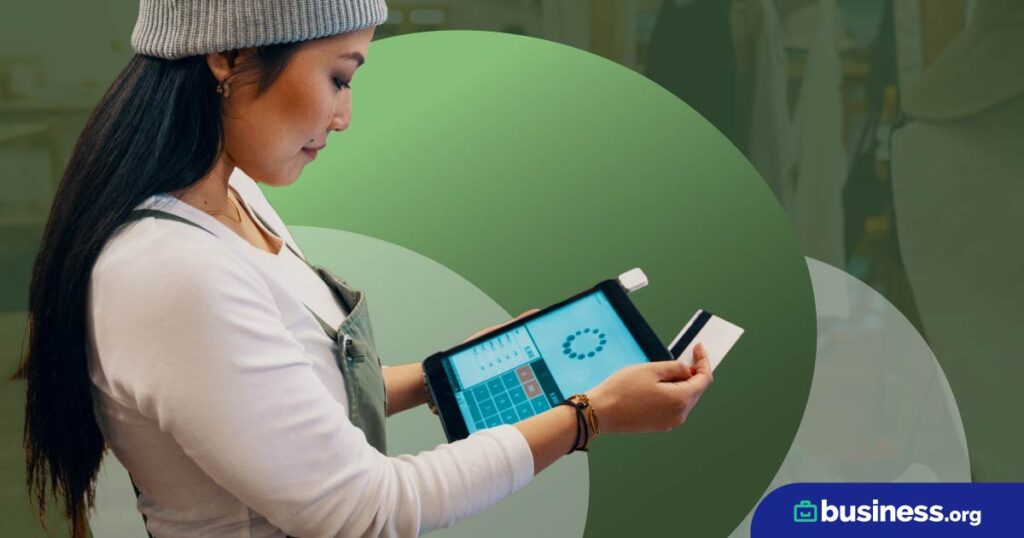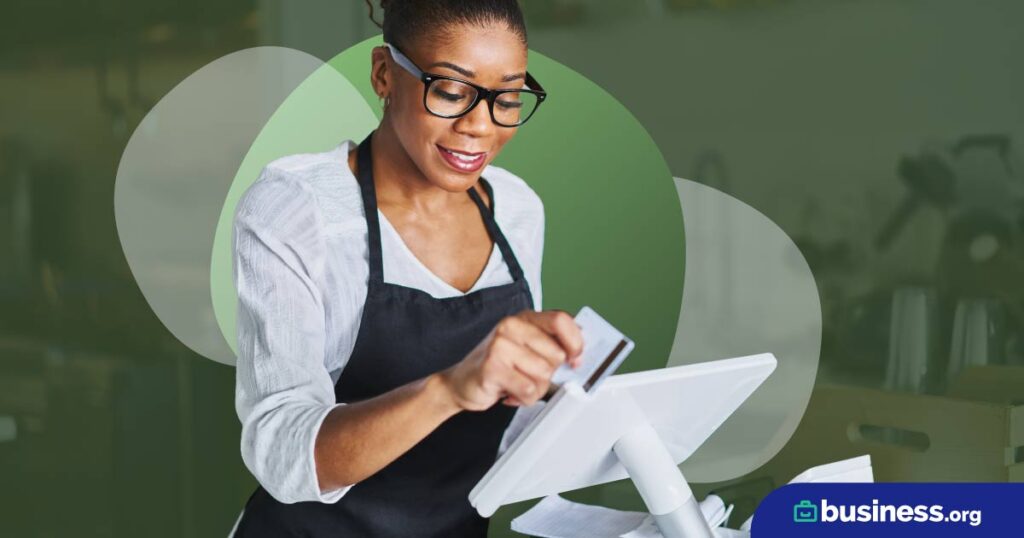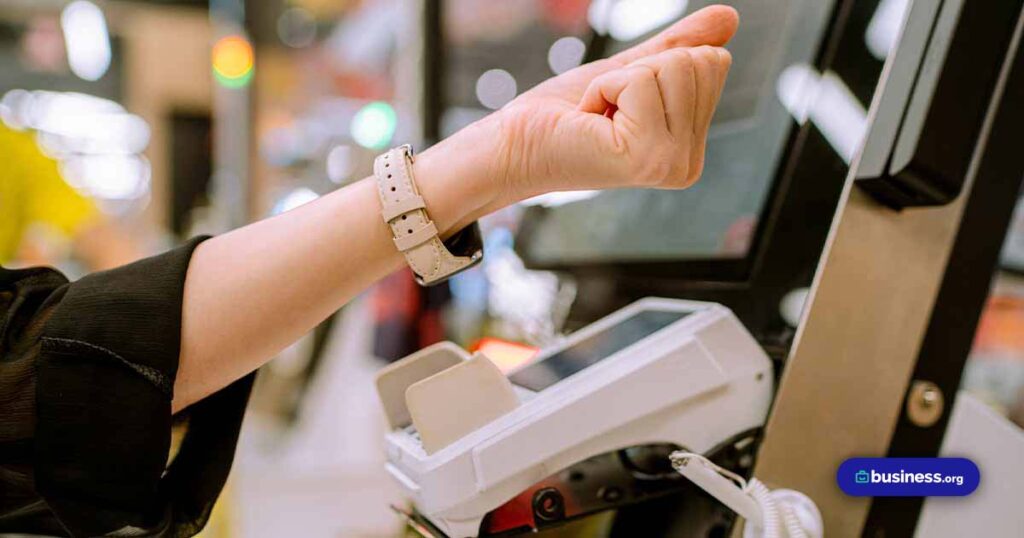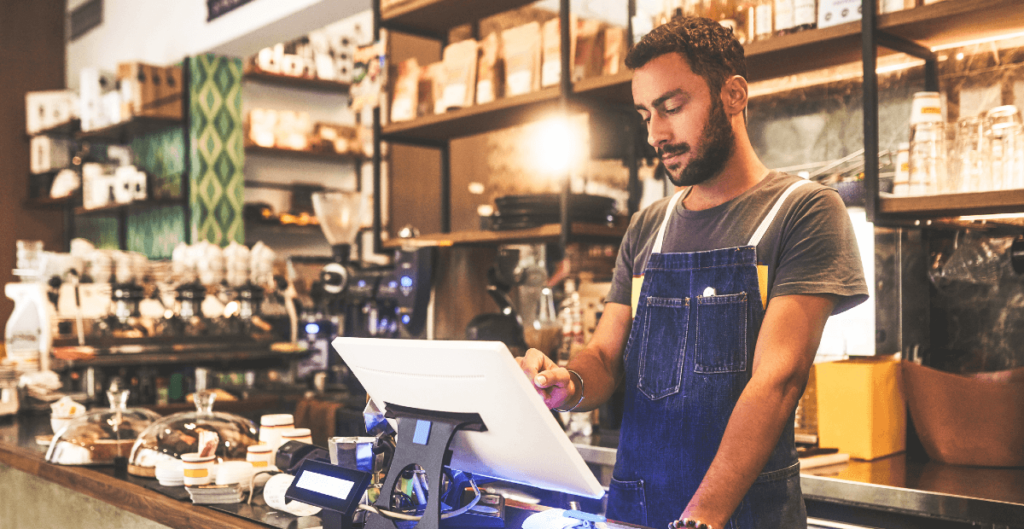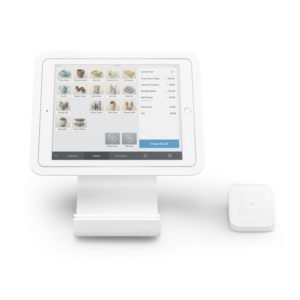We are committed to sharing unbiased reviews. Some of the links on our site are from our partners who compensate us. Read our editorial guidelines and advertising disclosure.
A Guide to Finding the Right POS System for Your Business
Today’s point-of-sale (POS) systems are much more than the iPad equivalent of a cash register. They are packed full of features that help small businesses run more efficiently. Whether you’re opening a café, retail shop, or gourmet food truck, there is a POS system that will fit the needs of your startup.
What is a POS system?
A point-of-sale system is a payment processing terminal that lets your customers pay for goods and services. It can also be used to record and track inventory, manage employees, and offer customer rewards programs. A POS system can help you streamline processes and collect data that provides valuable insight so you can make informed business decisions.
POS systems typically include a combination of hardware components and software applications. Sometimes the hardware is as small as a mobile card reader and the software is just an app on your smartphone. No matter the size, you stand to gain a lot from a POS system, so it’s important to understand which system and features will work best for you.
Hardware components of a POS system
The basic hardware components that come with most point-of-sale systems are a server, a computer terminal and keyboard at the checkout location, a cash drawer, a credit and debit card swiper, a pin pad, and a printer for customer receipts.
Depending on your business needs, other devices may include a barcode scanner for quick, automated data input; a customer-facing display; and a scale for weighing products. With the advancement in mobile and wireless technology, you may also want to invest in more efficient devices, such as touchscreen monitors, tablets, and smartphones.
The value of a POS system
A point-of-sale system can benefit your small business in a number of ways:
- Saves time by streamlining multiple operations using a central system
- Increases worker productivity and reduces administrative costs
- Provides detailed sales reporting and data analytics
- Reduces human error with automated systems
- Improves overall customer experience
What is an electronic point-of-sale (EPOS) system?
Similar to a traditional POS arrangement, an electronic point-of-sale (EPOS) system is used by small-business owners to accept payments from customers. An EPOS system is a combination of hardware and software that processes sales transactions and manages inventory in real time. Hardware includes a central computer terminal and peripheral devices, such as barcode scanners, receipt printers, and chip and pin devices, that connect to it wirelessly or via cables. And with the right POS system, you can customize the software to your industry and business needs.
EPOS systems stand out through their automatic inventory updates. If you don’t have time to manually update your inventory, drop the basic POS system for an EPOS system.
Here are some other ways EPOS software can save you time:
- Minimizes human error
- Automatically applies discounts and promotional pricing to ensure consistent product pricing
- Eliminates manual price checks
- Tracks employee performance and activities to determine top performers
- Simplifies time management by automatically recording employee schedules and work hours
- Automatically syncs business reports and data in real time
- Adjusts stock levels when items are sold
The downside of an EPOS system is the cost, and the software requires regular maintenance and updates. If you aren’t prepared to invest in a full-featured system right away, renting an EPOS system or taking on a flexible payment plan may be a better option.
What is a cloud-based POS system?
A cloud-based POS system is a web-based, software-as-a-service (SaaS) solution that stores your data in the cloud instead of on a computer. Unlike a traditional server-based POS system, you can access data, process payments, and get automatic updates via the internet.
But that’s not all. There are other helpful benefits of migrating to a cloud-based POS system:
- Your data is accessible anywhere, anytime via the internet.
- Inventory tracking and sales reporting in real time eliminate guesswork.
- Advanced analytics helps you make informed business decisions.
- The lack of software upgrades, maintenance, and licensing fees will save you money.
- Automatic upgrades and data backups help your business avoid costly downtime.
As mentioned above, cloud-based POS systems enable you to take your business anywhere. Plus, you can continue to take payments from your customers even if your internet connection is interrupted—your system will track sales and sync your data as soon as you’re back online. That makes a cloud-based platform ideal for small-business owners who travel to trade shows, art and craft fairs, and farmers and produce markets to sell products.
If you aren’t comfortable with migrating to the cloud, a traditional on-premises software solution may be a better choice for your new business. With this method, you can purchase software licenses and install the apps yourself on your computer system. On the flip side, you are also responsible for maintaining the software and installing upgrades.
Whatever software solution you choose for your start-up, make sure it’s customizable to fit your needs. You can start with basic POS features, such as recording sales transactions and inventory tracking, and as your business grows, you can add capabilities like employee management and custom analytics and reporting.
What are some POS system software features?
Customer relationship management (CRM) is a point-of-sale system feature that enables you to track patrons’ buying behavior, create customer profiles, and identify your most valuable customers. With this software, you can create loyalty and reward programs, personalize communication with your customers, and use other marketing tools to make a lasting impression on the folks buying your product or service.
Inventory management is an automated tool that enables small-business owners to gather data in real time, track best-selling items, and replenish stock quickly. Through barcode identification technology, you can receive, track, and sell items in real time. That means you can avoid the headache of recording sales and monitoring inventory levels on your own.
You want to bring your A game when you’re talking with customers, so quick and detailed information about your inventory is vital. Imagine if a customer asks about the availability of a specific item, and within seconds, you have an answer—without sifting through mounds of inventory in your back room. Improved customer service is just one of the benefits of a POS system with inventory management capabilities. Maximize your face-to-face time with your customers by knowing what products you have on hand. It doesn’t hurt to have quick access to quantity and pricing data either.
To keep your businesses running even more smoothly, POS systems with inventory management enable you to review and download detailed reports, receive low-stock alerts, and evaluate profit margins. With data reporting, you can make important decisions, such as how and when to adjust product pricing. You can also spend less time worrying about running out of popular items and more time creating quality experiences for your customers.
By signing up I agree to the Terms of Use and Privacy Policy.
How do I choose a POS system based on my industry?
As convenient as it would be to have one POS system to rule them all, one-size-fits-all POS systems don’t exist. Day-to-day operations and processes vary depending on the type of business. Whether you’re a retailer, restaurant owner, contractor, or food truck operator, some functions and features are must-haves, while others may not be quite as important.
Retail businesses
Those running a retail venture need POS system capabilities that offer customer convenience while streamlining the sales transaction process. A mobile point-of-sale (mPOS) system is a practical solution.
According to a retail POS market analysis, the expected compound annual growth rate of mPOS terminals is over 17% from 2016 to 2024.1 One contributing factor is that small-business owners are embracing the convenience of user-friendly tablets—a powerful substitute for traditional POS systems. With wireless technology evolving, the use of iPads, iPhones, smartphones, and other smaller devices are gaining traction.
Like a traditional POS system, an mPOS system also functions as a cash register, using handheld devices to process transactions rather than the usual hardware. With mPOS capabilities, you can ditch the register and engage with customers as they shop throughout the store. Your staff can interact with customers and take payments with their wireless devices instead of being stuck behind a checkout counter—meaning your customers will spend less time in aggravating lines and more time enjoying your business’s stellar services.
Before you commit to purchasing any POS system for your retail business, you may want to search for vendors that offer a free 30-day trial period and research what the best POS systems are for your business.
Restaurants, cafés, and bars
Whether you own a bar, café, or restaurant, look for tools to stay organized, simplify operations, improve staff interaction with customers, and provide top-notch dining experiences.
Some mPOS apps enable waitstaff to take orders tableside and send them directly to the kitchen—an efficient, time-saving feature your patrons will appreciate. When it’s time to pay the bill, customers can do that from their tables without waiting for their server, which can also prevent overcrowding at a single check-out location. To eliminate the hassle of manually totaling each customer’s amount, look for automatic gratuity calculations and bill-splitting features.
As a restaurant owner, you know that running out of ingredients to make your most popular menu items would be a disaster. With inventory management software, you can track ingredients and keep your kitchen stocked with the essentials.
Some restaurant-specific software is ingredient-based, which means you can break down recipe costs to the raw ingredients. By tracking the basics, you’ll have a better understanding of exactly how much you’re paying for each plate that leaves your kitchen. With this info, you can calculate your profitability and overall ROI.
Other restaurant POS systems feature floor plans with detailed information to help streamline workflows and boost decision-making. An at-a-glance, customized layout of your setup can provide greater visibility and help you with a few tasks:
- See how many customers a table will seat
- Identify high-value tables with exact bill amounts
- Easily seat large parties and transfer people to other tables
- Change your floorplan for groups and special events
- Eliminate confusion for new employees
Your business may also benefit from staff management and scheduling, menu management, and customized reporting. If your restaurant is open after normal business hours, you may want to invest in a POS system that offers 24/7 technical support and live chat.
Contracting and repair businesses
When you’re operating a contracting business, you have a lot to keep track of: customers, employees, suppliers, inventory, and more. Before you start scheduling jobs, you need to find a POS system that will keep you organized and keep up with the daily demands of your business. As a contractor, you’re likely to spend most of your time on the go, so an mPOS system is a good option for accepting payments no matter where you are.
Bidding a job is also a critical part of your work, so you may want to check out POS systems with construction estimating software to help you calculate labor costs and price materials. This feature can take the guesswork out of estimating jobs and come up with accurate proposals for your customers.
A POS system with scheduling, project workflows, time tracking, and equipment management capabilities could also be a good investment. Once you’re established, a POS system with a customer management feature can help you track information and build your business. It’ll also allow you to offer services like these:
- Schedule appointments with customers
- Keep a customer history with easy access to invoices
- Send receipts via email or text
- Track progress of ongoing jobs
- Record customer contact information for future projects
With so many moving parts to your daily operations, accounting software integrated with your POS system can streamline bookkeeping and accounting processes. You can free up time with automatic accounts payable and accounts receivable updates while ensuring accuracy and reducing the risk of error that comes with manual data entries. Organizing your business expenses and tracking important financial data is key to making your business more efficient, and when tax season arrives, you can easily access data and produce detailed reports for your accountant.
Food trucks
When you’ve got a food truck, you’re always on the go, so an mPOS system is a necessity. With an mPOS system, you can process transactions using iOS and Android devices, giving you the flexibility to take orders from your window or, if a long line is forming, send an employee with an iPad to take orders and interact with hungry customers.
A mobile system also allows you to operate without a Wi-Fi connection. So if your truck is parked in the middle of nowhere with no internet access, you don’t have to worry—you can still take orders and process payments.
As you get ready to take your culinary skills on the road, carefully think about what other features you’ll need. When you’re on the move, keeping in touch with customers via social media is important. A POS system with built-in Twitter integration allows you to communicate and monitor your Twitter feed quickly. You can also attract customers on Facebook and let them know your location, hours of operation, daily specials, and more.
Many mPOS systems come with a mobile credit card reader, which is a small device that easily attaches to a tablet or smartphone. Square is one affordable, user-friendly option for accepting payments on the go. By signing up, you get not only a free card reader and access to the mPOS app but also a flat fee of 2.6% + 10¢ with no additional transaction or monthly fees. Take a look at why Square is a popular choice in the food truck industry.
POS systems vs. credit card terminals—which solution is right for you?
Point-of-sale systems can tackle a range of tasks. They allow small businesses to accept credit and debit cards, print customer receipts, track inventory, and more. A POS system could include several hardware components, such as computer terminals, keyboards, and touchscreen monitors, or it can be designed for on-the-go use.
A credit card terminal is a small, lightweight machine with a screen, keypad, magstripe card reader, and signature pen. Yet unlike the versatile POS systems, credit card terminals have one main function: to process payments. Terminals do come in a variety of styles and setups—some work best for payment systems at fixed business locations while others are built with mobility in mind.
If you’d rather have something simple without too many bells and whistles, a credit card terminal may be a better fit for you. But if you’re interested in having extra features and programs for running your business efficiently—all in one place, mind you—start looking into POS systems.
The takeaway
With all of the different POS systems on the market, from basic setups to more advanced systems with a variety of tools and features, you might be focused on features and tech specs. But don’t forget to do your research when it comes to cost. For instance, some vendors charge a flat percentage for all credit card transactions with no fees for additional transactions.
If you don’t want to pay large up-front fees, other vendors offer lower monthly subscription rates and lease options. As a new business owner, you can also try free 30-day trial periods to help you decide if a POS system will work well for your business.
If you’re searching for recommendations on which POS system will work best for your business, you should check out our picks for the top POS systems of 2020.
Related content
Disclaimer
At Business.org, our research is meant to offer general product and service recommendations. We don't guarantee that our suggestions will work best for each individual or business, so consider your unique needs when choosing products and services.
Sources
1. Grand View Research, “Retail Point-of-Sale (POS) Terminals Market Analysis by Product (Fixed POS Terminals, Mobile POS Terminals), by Component (Hardware, Software, Services), by Application (Supermarkets/Hypermarkets, Grocery Stores, Specialty Stores, Gas Stations) and Segment Forecasts to 2024”
